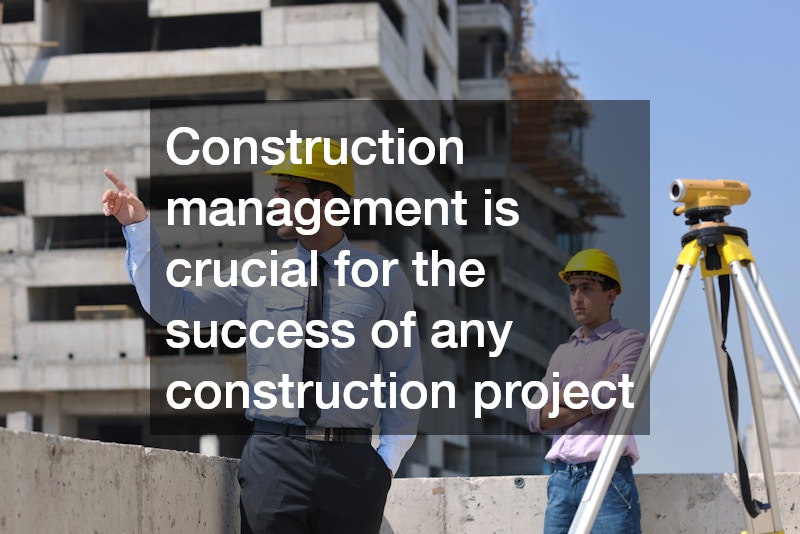Construction management is an essential aspect of any building project, whether residential, commercial, or industrial. The process involves overseeing the planning, coordination, and execution of construction projects, ensuring they are completed on time, within budget, and to the desired quality standards. With so many moving parts, it’s natural for individuals to have a range of questions about construction management.
In this article, we will address some of the top questions asked about construction management to provide you with a better understanding of what the process entails.
What Is Construction Management?
At its core, construction management refers to the process of managing and coordinating all aspects of a construction project. This includes overseeing the design, planning, budgeting, procurement of materials, hiring of contractors, scheduling, and ensuring that the project stays on track throughout its lifecycle. A construction management team works to ensure that the project is completed efficiently, safely, and to the specifications agreed upon by all stakeholders. Construction management involves a collaborative effort between owners, architects, engineers, contractors, and subcontractors to bring a project from concept to completion.
What Does a Construction Manager Do?
A construction manager plays a pivotal role in overseeing a construction project. Their responsibilities include developing and managing the project schedule, controlling costs, coordinating the construction team, and ensuring safety on the job site. Construction managers are responsible for ensuring that the project progresses according to plan and that any issues or delays are addressed promptly. Additionally, they are tasked with managing communication between all parties involved, such as the client, contractors, and vendors, to ensure the project is completed smoothly.
In some cases, construction managers also handle procurement, negotiating with suppliers to obtain the necessary materials, and ensuring that the construction process adheres to local regulations and codes. Overall, construction managers are responsible for ensuring the project is completed on time, within budget, and meets quality standards.
What Are the Different Types of Construction Management?
There are several types of construction management services, depending on the needs and scale of the project. These include:
-
General Contracting: This is the most traditional form of construction management, where the construction manager is responsible for all aspects of the project, including hiring subcontractors, managing schedules, and overseeing the execution of work on-site.
-
Construction Management at Risk (CMAR): In this model, the construction manager acts as a consultant during the design phase and assumes the risk of completing the project within a specified budget. The manager is responsible for delivering the project on time and at or below the agreed-upon price.
-
Construction Management Agency (CMA): In this model, the construction manager acts as an advisor to the project owner, assisting with the planning and oversight of the construction process. However, the project owner retains control over the contracts and payments to contractors.
Each of these approaches offers a different level of involvement and responsibility for the construction management team, allowing clients to choose the option that best fits their project’s needs.
Why Is Construction Management Important?
Construction management is crucial for the success of any construction project. It helps ensure that the project is completed on time, within budget, and according to the required specifications. Effective construction management mitigates risks by identifying potential issues before they arise and addressing them proactively. It also ensures that the construction process adheres to local building codes, safety regulations, and environmental guidelines, helping to avoid legal complications down the line.
Additionally, construction management can improve the overall quality of the project by streamlining processes and maintaining clear communication between all parties involved. With a construction management team in place, projects are more likely to run smoothly and be completed successfully.
What Are the Benefits of Hiring a Construction Management Company?
Hiring a professional construction management company brings several benefits to a project. These include:
-
Expertise and Experience: A construction management company has the necessary knowledge and experience to manage all aspects of a construction project. They understand the complexities of the industry, from scheduling to risk management, and can help navigate potential challenges.
-
Improved Efficiency: Construction management companies are skilled in coordinating all parts of a project, ensuring that tasks are completed in the right order and within the specified timeline. This leads to improved efficiency and a smoother construction process.
-
Cost Savings: Construction managers work hard to keep projects on budget by identifying potential cost savings, negotiating better deals with contractors and suppliers, and reducing the likelihood of costly delays or mistakes.
-
Risk Mitigation: A professional construction management team can help identify risks early on and take steps to mitigate them, minimizing the likelihood of issues that could delay the project or result in additional costs.
-
Quality Assurance: Construction managers are committed to maintaining high-quality standards throughout the construction process. They ensure that all work is completed to the highest standards and meets the required building codes and safety regulations.
Conclusion
Construction management is a vital component of any successful construction project. Whether you’re building a new home, office, or industrial facility, having an experienced construction management team on your side can ensure that the project is completed efficiently, on time, and within budget. By understanding the key aspects of construction management, including the roles and responsibilities of the construction manager, the types of services available, and the benefits of hiring a professional team, you can make informed decisions and ensure the success of your next construction project.
.


